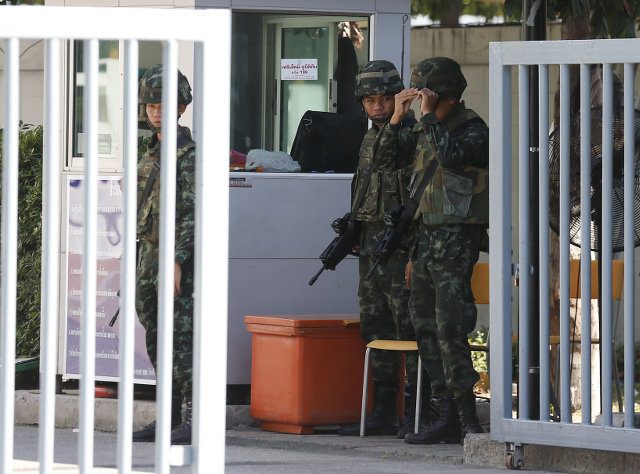SUMMARY
This is AI generated summarization, which may have errors. For context, always refer to the full article.

BANGKOK, Thailand – Thailand’s military called crisis talks Wednesday, May 21, between warring political rivals, vowing to stop the kingdom degenerating into another “Ukraine or Egypt” after imposing martial law to suppress months of street bloodshed.
US-led pressure grew for a return to civilian control but the Thai military, which has intervened repeatedly in politics down the decades, said it would respect international law and use force “only for issues of security.”
General Prayut Chan-O-Cha called a meeting between top officials of the ruling and opposition parties as well as the election commission, the Senate and the heads of the pro- and anti-government protest camps, an army spokeswoman said.
Caretaker Prime Minister Niwattumrong Boonsongpaisan, who replaced ousted premier Yingluck Shinawatra after a controversial court ruling earlier this month, was also invited.
Niwattumrong has called for fresh elections on August 3. But the opposition wants vaguely defined reforms first to tackle graft and has vowed to stay on the streets until it has eradicated the “regime” represented by Yingluck’s elder brother Thaksin Shinawatra.
Prayut invoked martial law Tuesday, saying that he had to act because political tensions have spiralled following the extended and deadly anti-government protests – a move critics branded a “de facto coup”.
“This must be resolved swiftly before I retire, otherwise I won’t retire,” Prayut, who is due to step down at the end of September, said according to a transcript of remarks released by the military.
“I will not allow Thailand to be like Ukraine or Egypt.”
In a new sign of its weakening hold on power, the caretaker cabinet was barred from using its emergency headquarters at a defense ministry office in the north of the capital.
“The government is now using a safe house,” said a government official who did not want to be named.
The capital Bangkok was calm Wednesday, with nonplussed Thais going about their business and the city’s bustling street life carrying on amid a noticeably lighter military presence compared to the day before.
‘Protect civil liberties’
But Tuesday’s dispatch of armed troops to the streets, the shutdown of more than a dozen television stations, and the sweeping powers assumed by the military have raised concerns over civil liberties.
The military can now ban public gatherings, restrict people’s movements, conduct searches, impose curfews and detain suspects for up to seven days.
Late Tuesday, four more satellite television stations were ordered to suspend broadcasts, bringing to 14 the number shut down.
Social media and other websites were instructed to halt the distribution of “provocative” material or criticism of martial law.
The military also issued an order that appeared to ban media outlets from interviewing anyone other than current government or military officials.
Thailand’s longtime ally the United States said it did not believe the army had staged a coup – avoiding sanctions required under US law – but urged the military to respect democracy.
“The army has stated publicly that it would be a temporary action. We expect them to abide by their commitment,” State Department spokeswoman Jen Psaki told reporters.
She said the United States was “encouraging calm, encouraging protection of civil liberties and freedom of speech and freedom of media”.
UN Secretary General Ban Ki-moon issued a statement urging “full respect for democratic principles and engagement in democratic processes”, while the European Union called for “a clear timetable” for a snap election.
The generals intervened after nearly 7 months of protests that have left 28 people dead and hundreds wounded.
They have left in place the caretaker government in office since the dismissal of Yingluck, whose brother Thaksin was himself ousted as prime minister in a 2006 coup.
Parties led by Thaksin or his allies have won every election over the past dozen years, to the dismay of an entrenched Bangkok-based elite who accuse him of corruption and posing a threat to the monarchy. – Rappler.com
Add a comment
How does this make you feel?
There are no comments yet. Add your comment to start the conversation.